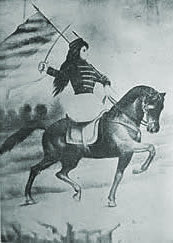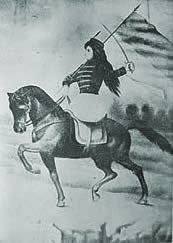
|
Women and Independence in Latin America An exploration of women's involvement in the Latin American Wars of Independence |

|

|
Women and Independence in Latin America An exploration of women's involvement in the Latin American Wars of Independence |

|
Gender:Male
Ethnic origen: White
Events:
| 1789 | - | Cartagena | - | Not applicable | - | He was born here 19 February 1789. |
| 1810 | - | Bogotá | - | Unknown | - | He was a diputado and attended the tertulia De Buen Gusto here. |
| 1815 | - | Bogotá | - | Unknown | - | He married Francisca Domínguez on 16 July 1815. |
| 1816 | - | Havana | - | Unknown | - | He was exiled here by Morillo in 1816. |
| 1816 | - | Colombia | - | Unknown | - | He was defeated by Morillo. |
| 1816 | - | La Plata | - | Unknown | - | He was taken here after being captured in 1816. |
| 1830 | - | Barnes | - | Unknown | - | He died 28 June 1830 in Barnes, England. |
Connections:
Bello friendsBiography:
Born on 19 February 1789, his parents were Gabriela Fernández de Castro and Pedro Fernández de Madrid, one of the most notable families in the region. He went from his native Cartagena to Bogotá as Diputado of the United Provinces in 1813. He met and married Francisca Domínguez, daughter of José María Domínguez, a rich, important patriot. They married on 16 July 1815. In 1816? they fled Bogotá, travelling on foot through the jungle, at times forging a path by machete. Domínguez caught a fever and Fernández Madrid gave a piece of gold to buy water to quench her thirst. They were caught by the royalists at the end of July in Chaparral and were taken to La Plata (Colombia) where he was ordered to be incorporated into the royalist troops, and she was taken back to Bogotá. He, his wife and his brother, Francisco Madrid, were condemned to exile in La Habana in August 1816?. (Monsalve, 149-150)
He was exiled to Spain. (Monsalve, 173)
He was called "El Sensible". (Anderson, 204)
He studied law and medicine, worked as a diplomat in France and England for independent Colombia. He wrote several plays, and wrote for the newspaper Argos Americanos sometimes using the pseudonym Empédocles. . (Ardila, 20)
A journalist, diplomat, translator and poet who wrote the national song “Himno a Bolívar”. (Sánchez López)
He wrote the tragedies Atala and Guatimocín, the latter in praise of Colombia’s indigenous heroes. (Ardila, 464, 471)
He attended Manuela Santamaría de Manrique’s tertulia De Buen Gusto when “just a boy”. His play Atala (said to be based on the story of the French Chateaubriand) was performed in Cuba in 1820. Fernández Madrid wanted to rehabilitate the indigenous, but nonetheless did so within a neo-classical French style, ignoring the Aztec, Maya and Inca traditions. (Arcinegras, 688, Monsalve, 22)
Coester gives his year of birth as 1784. He was friends with José Joaquín Olmedo and Andres Bello. He wrote poems in praise of Bolívar. (Coester, 69)
He was exiled for his part in the independence struggles. (Monsalve, 24)
He married María Francisca Domínguez del Castillo, from the Domínguez Roche family. (Monsalve, 149)
He died on 28 June 1830 in Barnes, England.
Brother-in-law of Rosa Domínguez Roche.
References:
Anderson Imbert, Enrique (1954) Historia de la literatura hispanoamericana, Tomo I, La Colonia cien años de República
Arciniegas, Germán (1988) Manuel de literatura colombiana
Ardila A, Hector M. (1984) Hombres y letras de Colombia
Coester, Alfred (1919) The Literary History of Spanish America
Monsalve, José D (1926) Mujeres de la independencia
Sánchez López, Luis María (1985) Diccionario de escritores colombianos